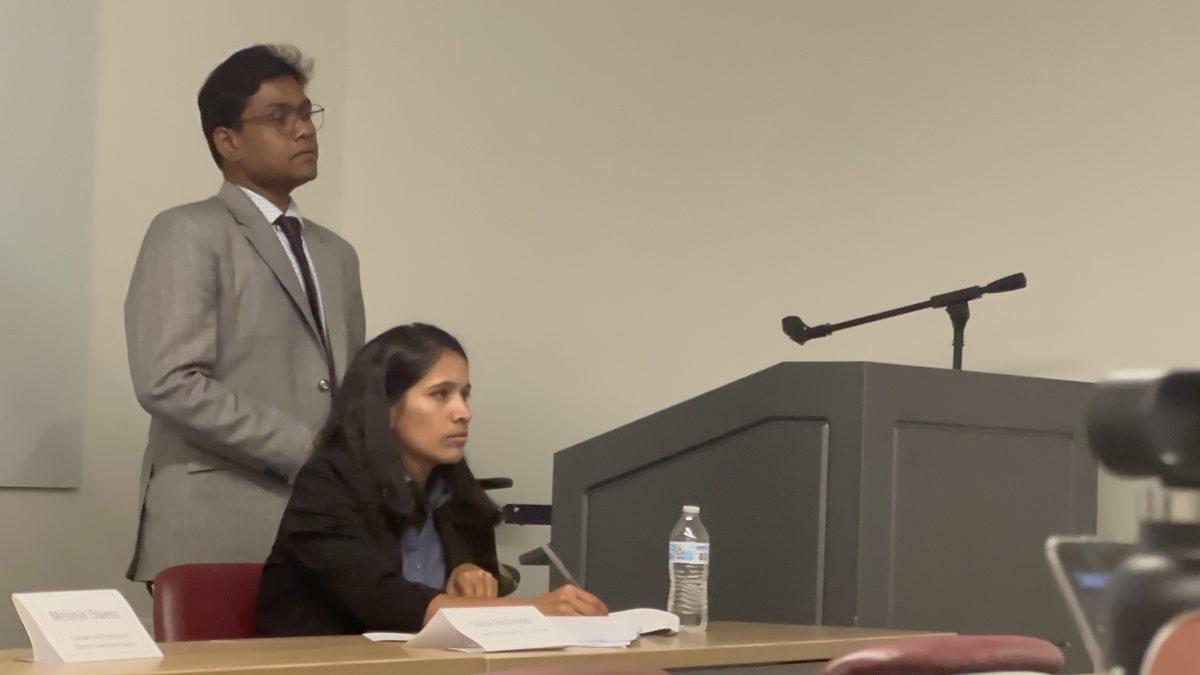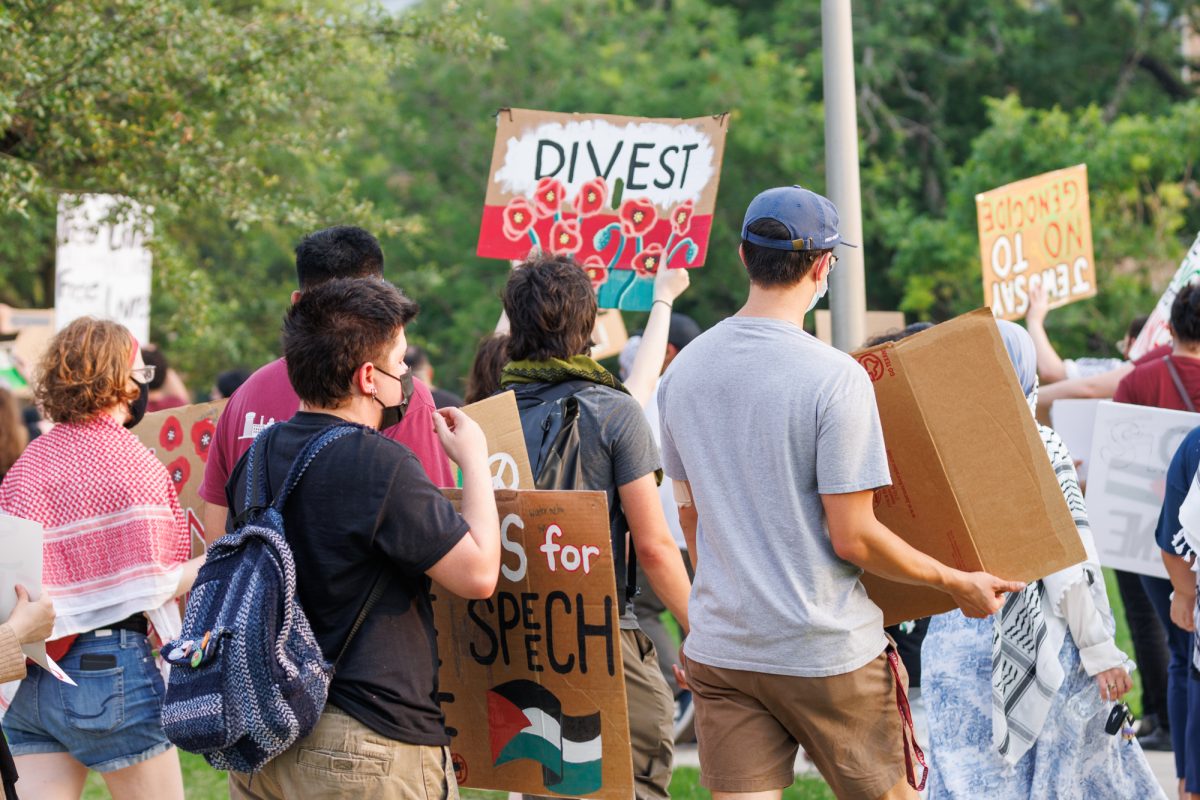In a roundtable discussion hosted by the Graduate and Professional Student Government, or GPSG, representatives from various organizations gathered in the Student Services Building on Nov. 3 to discuss issues they’ve faced while studying at Texas A&M — ranging from low stipends to teaching assistant issues and SB 17 compliance.
After an introduction, the GPSG Vice President of Culture and Inclusivity Sambandh Dhal began the agenda with complaints from the Biomedical Engineering Graduate Student Association. Biomedical engineering graduate Claudia Collier took the floor, saying there were worries that students in her department wouldn’t be getting a stipend increase that was discussed among students and staff.
Other attendees expressed similar concerns, such as material science & engineering graduate Sophia Ahmed, co-president of Queer Graduate and Professional Aggies and president of the Queer Empowerment Council.
“[Stipends are] also inconsistent across the board for different departments,” Ahmed said. “We have a friend in animal science who gets … like $1,700 [a month]. That’s barely liveable.”
Collier also said the International Student & Scholar Services, or ISSS, the A&M office that assists international students, can take weeks to respond, even for basic questions.
“There’s a lot of students in our department that aren’t really getting the help that they need,” Collier said.
Industrial engineering graduate Lorena Mejia, the other Queer Graduate and Professional Aggies co-president, said she’s had a similar experience, and often, there’s only been one individual from ISSS who can answer her questions.
Electrical engineering graduate Ankur Kumar, representing the Electrical and Computer Engineering Graduate Student Association, said in lieu of ISSS, some departments, including his, have made folders with information international students need to know, and students should speak with their advisors to create one if it doesn’t exist already.
Graduate students aren’t being matched with their expertise when assigned as teaching assistants, Dhal said, and despite one student’s research work, they could be assigned to teach a subject they have no knowledge of.
Industrial/organizational psychology graduate Benjamin Schulte, representing the Psychology Department Organization of Graduate Students, said that issue is common in his department — and is worsened because they often get assignments late.
“They have to spend a lot of time preparing, creating the syllabi and actually learning the material — which they’re not familiar with — and because we get the assignment so late in the year, it doesn’t give us a lot of time to prepare,” Schulte said.
Collier said in one case, a graduate with expertise in circuits was assigned to instruct a lab on cells. In another case, Mejia said a graduate was told on a Wednesday she was instructing a lab that Friday — teaching software she never learned herself.
“She had never seen that software,” Mejia said. “She had never done anything on that software, and she had to teach it two days later. She had no idea what she was doing.”
Scholarships and opportunities for international students are also rare, according to civil engineering graduate Flavia Patrascu, a representative for the Civil and Environmental Graduate Student Association.
Patrascu said after a sudden university bill of around $1,000 in 2022, she tried looking everywhere for ways to fill the hole in her budget. However, she said she was told the scholarships in her department come from private donors and are meant exclusively for U.S. citizens and permanent residents.
Patrascu also said bus timing for off-campus routes is inconsistent, affecting graduate students who rely solely on buses for transportation. GPSG Respect Chair James Le, a former employee at the transportation services, said there aren’t enough student drivers, the training period is long and there aren’t enough mechanics to fix the existing buses.
The new bus application also disrupts not only graduate students — but all of A&M, according to computer engineering graduate Souryendu Das, an Indian Graduate Student Association representative, as its design is confusing to those unfamiliar with certain routes.
More clarity is also needed in the insurance process for international graduates, Patrascu said, as they often aren’t covered when they start working.
“Starting to have insurance from day one, whenever you do the onboarding, that would be great,” Patrascu said. “ … If you start working, you should be covered.”
Graduates sometimes have to pay hundreds of dollars for insurance out of their own pocket, Patrascu said.
Dhal spoke for the Computer Science Graduate Student Association, which wasn’t able to attend the meeting, saying a stipend and leave of absence for pregnant students in the department makes sense because much of the work in the department can be done from home.
“Our university doesn’t allow that — UT Austin does allow it — but [A&M] doesn’t allow [it],” Dhal said.
Kumar said it’s because graduate students aren’t treated as employees, despite the work they do on campus.
“There’s a distinction of, ‘You are a student, but you are being paid. But you are not [an A&M] employee’ …,” Kumar said. “ … There’s no clarity. If you go and ask this, even to your payroll department, they’ll say, ‘Oh, it’s because you’re not [an A&M] employee, per se,’ so I just don’t understand what that means. We do everything which an employee does.”
Plant breeding graduate and GPSG community outreach member Usha Pedireddi said as a research assistant, she was required to be in her lab, despite being pregnant.
“I couldn’t take a single leave,” Pedireddi said. “Even just before my delivery.”
Le said career fairs for international students have become a growing issue as well. Many industries aren’t accepting international student applications and existing career fairs host hundreds of students with few companies present, with international students often having it more difficult than others.
Aerospace engineering graduate Maddie Haas, representing the Aerospace Engineering Graduate Student Association, said that’s especially true for aerospace engineering international graduates, as the U.S. aerospace industry is dominated by defense and government positions that only accept U.S. citizens.
Representatives also discussed pushing for mandating an Aggie Honor Code training for international students before moving on to SB 17 and related concerns.
“The general queer concerns [from] people in our organization have to do with the lack of gender-neutral bathrooms on campus,” Mejia said. “Obviously, this is not a thing that can be fixed in five minutes … but there’s a scarcity of gender-neutral restrooms.”
Mejia said faculty and staff misgendering students has become a growing issue as well, a complicated problem worsened by the power imbalance between students and professors, she said.
“Also, sometimes with advisors, they lack sensitivity,” Ahmed said. “I wish there was some sort of sensitivity training, given how nuanced it is to be queer.”
Ahmed said due to SB 17, the Pride Center will be renamed, and her organization, the Queer Empowerment Council, will be taking over events the center previously helped host.
The representatives concluded that they would meet again, likely next semester, to discuss more issues and see if anything had changed since the first meeting before adjourning after over two hours of discussion.










